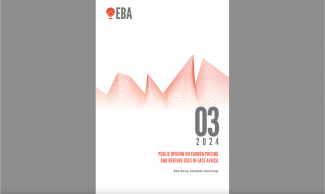FILTER
Displaying 1 - 10 of 66 publications
Estimating the cost to society from a ton of CO 2, termed the social cost of carbon (SCC), requires connecting a model of the climate system with a representation of the economic and social effects of…
| Peer Reviewed |Abstract Implementing emissions pricing in developing countries calls for increased focus on the political, economic, and social challenges these countries face. By discussing various types of…
| Peer Reviewed | Global HubCarbon pricing has recently gained further momentum from the European Union (EU)'s plan for the Carbon Border Adjustment Mechanism (CBAM). The CBAM aims to align the greenhouse gas (GHG) emission…
| Peer Reviewed | VietnamAbstract Since agriculture is responsible for a considerable share of anthropogenic greenhouse gas emissions (GHGE), this paper examines the impact of various carbon taxes designed to incentivize…
| Peer Reviewed |Abstract This report examines the impact of public innovation subsidies and the EU Emission Trading Scheme (EU ETS) on green innovation in Swedish industrial firms. Analyzing green patents from 1985…
| Report | Sweden, Global HubForeword by EBA The ongoing climate crisis calls for radically reduced emissions of greenhouse gases. Although low- and lower-middle-income countries may have small or minimal climate footprints…
| Report | Global HubEmerging countries including Ghana have witnessed significant growth in their industrialisation and urbanisation. Getting an understanding of their effects on carbon emissions has gained the attention…
| Book Chapter | GhanaUsing territorial- and consumption-based carbon emissions as proxies for carbon risk, the study examined the impact of innovation on carbon risk while controlling for institutional quality and…
| Peer Reviewed | Ghana
Despite the potential for forest resources to act as a less costly shock-coping strategy for rural households, evidence of the nexus between access to forest resources and the nature of coping...
| Peer Reviewed | UgandaDespite being the region with the least levels of carbon emissions in the world, African countries are facing unique challenges on climate change, increased carbon emission levels and the need for…
| Peer Reviewed | Nigeria